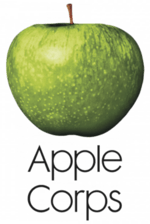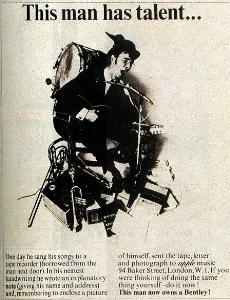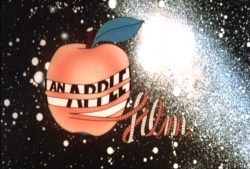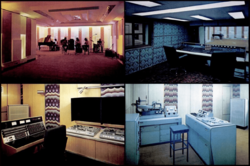Apple Corps facts for kids

Logo featuring a Granny Smith apple
|
|
|
Formerly
|
|
|---|---|
| Private | |
| Industry |
|
| Founded | 20 June 1963 (as The Beatles Limited) |
| Founders | John Lennon Paul McCartney George Harrison Ringo Starr |
| Headquarters | London, England |
|
Area served
|
Worldwide |
|
Key people
|
Tom Greene (CEO) |
| Revenue | £18.6 million (2019) |
|
Operating income
|
£5.5 million (2019) |
| £4.4 million (2019) | |
| Owners | Paul McCartney Ringo Starr Estate of John Lennon Estate of George Harrison |
| Subsidiaries | See list |
Apple Corps Limited is a British company started by the famous band The Beatles in the 1960s. They wanted to create a group of different businesses. The company's name, "Apple Corps," sounds like "apple core" and is a clever play on words.
Its main part is Apple Records, which began in 1968. Other parts included Apple Electronics, Apple Films, Apple Publishing, and Apple Retail. The most famous retail business was the Apple Boutique, a shop in London that was open for a short time.
Apple's main offices were in different places in London during the late 1960s. One important location was 3 Savile Row, also known as the Apple Building. This building also had the Apple recording studio. For many years, Neil Aspinall, who used to be The Beatles' road manager, was the chief executive of Apple Corps. In 2007, Jeff Jones took over as chief executive. In 2010, Apple Corps was named one of the most innovative music companies. This was thanks to the video game The Beatles: Rock Band and new versions of The Beatles' music.
How Apple Corps Started
The Beatles' money experts told them they had a lot of money. They could either invest it in a business or lose a lot of it in taxes. So, The Beatles decided to start their own company. This way, they could manage their money better.
Derek Taylor, The Beatles' publicist, remembered that Paul McCartney came up with the name "Apple." He thought of it like how a child learns "A is for Apple." McCartney also suggested "Apple Core," but they couldn't register that name. So, they used "Corps," which sounds the same. McCartney was inspired by a painting of a green apple by René Magritte. This painting later became the idea for the Apple logo.
Forming the Company
John Lennon explained that they were setting up a company for records, films, and electronics. He said they wanted to create a system where artists could make films or other projects without begging for money. McCartney added that they didn't need more money for themselves. They wanted to share opportunities with others.
The first step was to create a new business structure called Beatles and Co. in 1967. Under this plan, each Beatle owned 5% of Beatles and Co. A new company, which became Apple, owned the remaining 80%. This new setup helped them pay less in corporate taxes.
After their manager Brian Epstein passed away in August 1967, The Beatles decided to take more control of their finances. Apple was meant to help The Beatles manage their own business. It also aimed to support other artists who needed help getting their projects started. Ringo Starr mentioned that they wanted to make records and sign other artists to their label.
The Apple logo was designed by Gene Mahon. In January 1968, Beatles Ltd. officially became Apple Corps Ltd. They registered the "Apple" name in many countries. By February, they had registered several divisions. These included Apple Electronics, Apple Films, Apple Music Publishing, Apple Records, and Apple Retail. They planned to focus on five main areas: records, electronics, film, publishing, and retail.
Lennon and McCartney introduced their new business idea at a press conference in New York City in May 1968. McCartney described it as "a beautiful place where you can buy beautiful things." Lennon said it was a company for records, films, and electronics.
Early Management
For the first few months, Apple didn't even have its own office. Most of the business was done from Brian Epstein's old company building. In late 1967, Apple finally opened an office in London. The Beatles already owned a building at 94 Baker Street, so they used that.
After Epstein's passing, Alistair Taylor became the General Manager for Apple. Taylor appeared in a famous advertisement designed by McCartney. It showed him dressed as a one-man band, asking for new artists. This ad brought many people hoping to get money from The Beatles. George Harrison later said that "every freak in the world" came to them. Many people received investments but were never heard from again.
Even though Apple was named the most successful new record company in 1968, it soon faced money problems. The band members didn't know much about business. Their goal of funding unknown artists without a clear plan led to financial difficulties.
Employees at Apple also took advantage of the situation. They made many personal purchases and international calls, treating them as business expenses. Ringo Starr later said, "We had, like, a thousand people that weren't needed, but they all enjoyed it. They were all getting paid for sitting around."
Eventually, Neil Aspinall agreed to manage the company temporarily. In 1969, The Beatles hired Allen Klein as their manager. He quickly made changes to improve Apple Corps' finances.
The Beatles' Break-up and Beyond
The first two years of Apple's existence also saw The Beatles' relationships worsen. This led to the band breaking up in April 1970. Apple quickly fell into financial trouble. It took many years of legal work to fix these problems. When The Beatles' partnership ended in 1975, they thought about closing Apple Corps. However, they decided to keep it running but stopped most of its divisions.
Today, Apple Corps is located in London. Paul McCartney, Ringo Starr, and the families of John Lennon and George Harrison still own and control the company.
Apple Corps has had many legal disagreements with Apple Inc. (formerly Apple Computer) over the "Apple" name. These disputes were finally settled in 2007. Apple Corps transferred ownership of the "Apple" name and trademarks to Apple Inc. In return, Apple Inc. allowed The Beatles' company to continue using them. In April 2007, Apple also settled a long-standing disagreement with EMI. Jeff Jones replaced Neil Aspinall as chief executive.
Subsidiaries
Apple Corps had different parts, mostly related to music and other media.
Apple Electronics
Apple Electronics was the part of Apple Corps that focused on electronics. It was led by Magic Alex, a friend of The Beatles. He wanted to create new electronic products. However, his ideas were not practical for business. After Magic Alex left in 1969, Apple Electronics faced the same problems as the rest of the company. It was later estimated that Magic Alex's projects cost The Beatles at least £300,000.
Apple Films
Apple Films is the part of Apple Corps that made films. Its first movie was The Beatles' 1967 TV film Magical Mystery Tour. The Beatles' films Yellow Submarine and Let it Be were also made by Apple Films.
Other notable films included Raga (a 1971 film about Ravi Shankar), The Concert for Bangladesh (1972), and Little Malcolm (1974). Apple Films also made TV ads for Apple Corps.
Here is a list of films from Apple Films:
- Magical Mystery Tour (1967). Starring The Beatles.
- Yellow Submarine (1968). An animated film featuring The Beatles.
- Did Britain Murder Hanratty? (1969). A documentary film.
- Let It Be (1970). A documentary about The Beatles.
- Raga (1971). A documentary featuring Ravi Shankar and George Harrison.
- The Concert for Bangladesh (1972). A concert documentary featuring George Harrison, Ravi Shankar, and others.
- Born to Boogie (1972). A documentary featuring Marc Bolan and Ringo Starr.
- Son of Dracula (1974). Starring Harry Nilsson and Ringo Starr.
- Little Malcolm (1974). Starring John Hurt and David Warner.
Apple Publishing
Apple's music publishing part started before the record company. In 1967, the first songwriters signed were Paul Tennant and David Rhodes. Apple published their songs starting in 1968. Another early band on their publishing list was Grapefruit.
Apple Publishing Ltd. also helped George Harrison and Ringo Starr manage their own songs. Apple's biggest publishing successes were the Badfinger songs "No Matter What", "Day After Day", and "Baby Blue". Also, Badfinger's "Without You" became a worldwide hit for Harry Nilsson in 1972 and Mariah Carey in 1993.
Apple also published music for other Apple artists like Yoko Ono, Billy Preston, and the Radha Krishna Temple. Many demo tapes were sent to Apple. Some songs were published, and some were released on other labels.
Apple Books was not very active. One important book was The Beatles Get Back, which came with the Let It Be album. It had photos by Ethan Russell and text by Rolling Stone writers.
Apple Records and Zapple Records
From 1968 onwards, new music by The Beatles was released by Apple Records. Apple Records also signed many other artists. These included Indian sitar player Ravi Shankar, Welsh singer Mary Hopkin, the band Badfinger, classical composer John Tavener, soul singer Billy Preston, and folk singer James Taylor.
Zapple Records was a special label started in 1969. It was meant to release spoken-word and experimental records at a lower price. However, the records ended up costing the same as regular music albums. Zapple Records closed down after only two releases: John Lennon and Yoko Ono's Unfinished Music No. 2: Life with the Lions, and George Harrison's Electronic Sound.
Apple Retail
The Apple Boutique was a shop located at 94 Baker Street in London. It was one of the first businesses started by Apple Corps. The shop opened on December 7, 1967. John Lennon and George Harrison attended the opening.
The boutique never made a profit. This was mainly because of shoplifting by customers and even some staff. The shop closed on July 31, 1968. Before it closed, the remaining items were given away for free.
Apple Studio
Apple Studio was a recording studio located in the basement of the Apple Corps headquarters at 3 Savile Row. It was bought in 1968. The studio was renamed Apple Studios after it was made bigger in 1971.
The first design for the studio didn't work well. The Beatles still recorded parts of their album Let It Be there, using equipment borrowed from EMI. They even had to turn off the building's heating system because the sound could be heard in the studio.
The studio was redesigned and rebuilt by former EMI engineer Geoff Emerick. This took 18 months and cost a lot of money. The studio reopened on September 30, 1971. It had modern recording equipment. In 1971, it cost about £37 an hour to record. George Harrison attended the opening party.
The studio became a second home for Apple Records artists. However, they also used other studios in London. The only Beatle solo album that used Apple Studio a lot was George Harrison's Living in the Material World in 1973. Other artists like Harry Nilsson and Marc Bolan also worked there. Apple Studio closed on May 16, 1975.
Legal Challenges
Apple Corps vs. Apple Inc.
In 1978, Apple Records sued Apple Computer (now Apple Inc.) over the use of the "Apple" name. They settled the lawsuit in 1981. Apple Computer agreed to stay out of the music business.
However, a disagreement came up again in 1989. Apple Corps said that Apple Computer's machines, which could play MIDI music, broke the 1981 agreement. In 1991, they reached another settlement. In 2003, Apple Computer was sued again by Apple Corps. This time it was for creating the iTunes Music Store and the iPod. Apple Corps said this broke their agreement not to distribute music. The trial began in 2006, and Apple Corps lost the case.
On February 5, 2007, Apple Inc. and Apple Corps announced they had settled their trademark dispute. Apple Inc. took ownership of all "Apple" trademarks, including the famous "Granny Smith" Apple Corps Ltd. logos. Apple Inc. then allowed Apple Corps to continue using some of those trademarks. This settlement ended the lawsuit. Apple Inc. continued to use its name and logos on iTunes.
The website for The Beatles: Rock Band video game was the first sign of this settlement. "Apple Corps" was clearly mentioned, and the "Granny Smith" Apple logo appeared. The text under the logo now said "Apple Corps" instead of just "Apple."
On November 16, 2010, Apple Inc. made The Beatles' entire music collection available on the iTunes Store.
Apple versus EMI
In 1979, The Beatles claimed that EMI and Capitol had not paid them enough money. They settled this case in 1989. The band received a higher payment rate, and EMI and Capitol had to follow stricter rules for checking their accounts. In 2005, Apple again sued EMI for unpaid money. This case was settled in April 2007 with a "mutually acceptable" agreement that remained private.
Apple versus Nike/EMI
In July 1987, Apple Corps sued Nike Inc, its advertising agency, EMI, and Capitol Records. This was because they used the song "Revolution" in a Nike commercial. Apple said they were not told about the song's use and were not paid for it. They sued the companies for $15 million. EMI argued that the case was "groundless" because Yoko Ono Lennon, who owns part of Apple Corps, supported the use of the song.
George Harrison spoke about the importance of this case. He said that if it was allowed, every Beatles song could be used to advertise products. He felt they needed to stop it to set an example. He said, "It's one thing when you're dead, but we're still around! They don't have any respect for the fact that we wrote and recorded those songs, and it was our lives."
On November 9, 1989, the lawsuit was settled outside of court. The details of the agreement were kept secret. However, it was suggested that a large amount of money was exchanged. Nike also stopped using the song in their advertisements in March 1988.
See also
 In Spanish: Apple Corps para niños
In Spanish: Apple Corps para niños
 | Janet Taylor Pickett |
 | Synthia Saint James |
 | Howardena Pindell |
 | Faith Ringgold |




